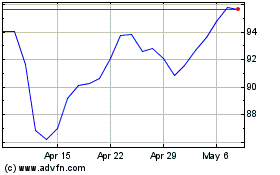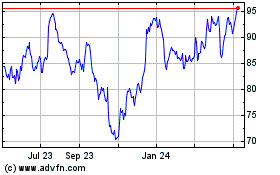SYDNEY—Investors continued to dump shares in mining giant BHP
Billiton Ltd. Monday following the deadly dam burst last week at
its jointly owned iron-ore mine in Brazil, even as the company
sought to clarify responsibility for the disaster that has already
claimed the lives of three people.
The mining giant said Monday it still hasn't determined what
caused one dam to fail and another to be "affected" last Thursday
at the mine in Minas Gerais state. It said its chief executive
Andrew Mackenzie and the head of its iron ore business, Jimmy
Wilson, would head to Brazil later this week to assess what further
support it could provide for the response effort.
BHP also stressed in an emailed response to questions from The
Wall Street Journal that Samarco, the company it 50:50 owns with
Brazil's Vale SA, was "responsible for the entirety" of the
operations at the iron ore mine.
BHP appoints half of the directors on the board of Samarco, and
receives "regular reports" on its operations, the company said.
However, it declined further comment on the nature of its oversight
of the Samarco company.
Nonetheless, as more information about the extent of the damage
caused by the dam burst emerges, analysts are trying to tot up the
potential bill for both BHP and Vale SA. The dam breach was the
largest-ever spill of its kind, according to Robert Chambers,
president of the nonprofit Center for Science in Public
Participation, whose group has tracked these types of failures back
to 1915.
The cost to the companies, including for cleanup and rebuilding,
could top US$1 billion, said Paul Young, a Sydney-based analyst at
Deutsche Bank, who estimated the mine could be closed until about
2019. He described the dam burst as "catastrophic."
BHP's Australian shares ended the day down 5.6%, taking total
losses since news of the accident broke to more than 7% and the
stock to its lowest level in seven years. BHP is dual-listed in
Australia and the U.K.
"The uncertainty regarding cleanup and legal costs is likely to
be an overhang on" shares, according to Jefferies analyst
Christopher LaFemina, who said the reputations of both BHP and
Vale, which have relatively good safety records, would emerge
damaged.
BHP said there are three so-called tailings dams used to store
mineral waste and water at the mining operation. One burst,
spilling the contents into the collection of waste held back by a
second—as well as across a rural swath of southeastern Minas
Gerais, where it inundated the village of Bento Rodrigues. The
third dam is being monitored by Samarco Mineraç ã o S.A, the mine's
operator, BHP said.
"At this time, there is no confirmation of the causes of the
tailings release," BHP said in its regulatory filing.
Morgan Stanley analysts said it was unclear whether insurance
will cover part of the cost for Samarco, which operates as an
independent company. Samarco was holding US$700 million of cash and
US$4.9 billion of debt on its balance sheet at the end of June, it
said.
"Potentially, the Samarco joint venture will have to reapply for
its operating and environmental licenses," it wrote in a note.
Brazilian officials on Sunday raised the death toll to three
people, two of whom were found in the path of the mud flow, and a
third who died while receiving medical treatment. That number is
expected to rise, as at least 28 people are now confirmed
missing.
Samarco said the state Civil Defense authorities are in charge
of the rescue operations, but that it is supporting those efforts.
The company said in a statement it has rented seven helicopters for
use by rescuers, delivered food and water and found housing for 588
residents left homeless.
"BHP Billiton will continue to work with Samarco, Vale, the
local communities, local authorities, regulators and insurers to
assess the full impact of this tragic incident," BHP said.
The shutdown will reduce BHP's iron-ore production this fiscal
year—cutting into profits at a time when falling commodity prices
already are already making it more difficult for the company to
keep its promise to maintain or lift shareholder dividends. Samarco
last year accounted for roughly 3% of BHP's underlying
earnings.
Analysts also expressed concern that any costs borne by BHP for
cleaning up after the dam spill could eat into its ability to pay a
dividend, a key attraction of the stock for investors. BHP aims to
either maintain or grow its dividend each year.
"This accident will add further pressure to BHP's cash flow,
growth and safeguarding of the progressive dividend," said Deutsche
Bank's Mr. Young.
The Anglo-Australian miner said it is now reviewing its
full-year iron-ore projections. Samarco had only recently ramped up
output after an expansion that included the construction of a new
processing plant. The mining operation has the capacity to produce
30.5 million metric tons a year of iron-ore pellets, used in steel
production.
Write to Rhiannon Hoyle at rhiannon.hoyle@wsj.com and Andrew
Peaple at andrew.peaple@wsj.com
Access Investor Kit for "Deutsche Bank AG"
Visit
http://www.companyspotlight.com/partner?cp_code=P479&isin=DE0005140008
Subscribe to WSJ: http://online.wsj.com?mod=djnwires
(END) Dow Jones Newswires
November 09, 2015 08:05 ET (13:05 GMT)
Copyright (c) 2015 Dow Jones & Company, Inc.
Morgan Stanley (NYSE:MS)
Historical Stock Chart
From Mar 2024 to Apr 2024

Morgan Stanley (NYSE:MS)
Historical Stock Chart
From Apr 2023 to Apr 2024
